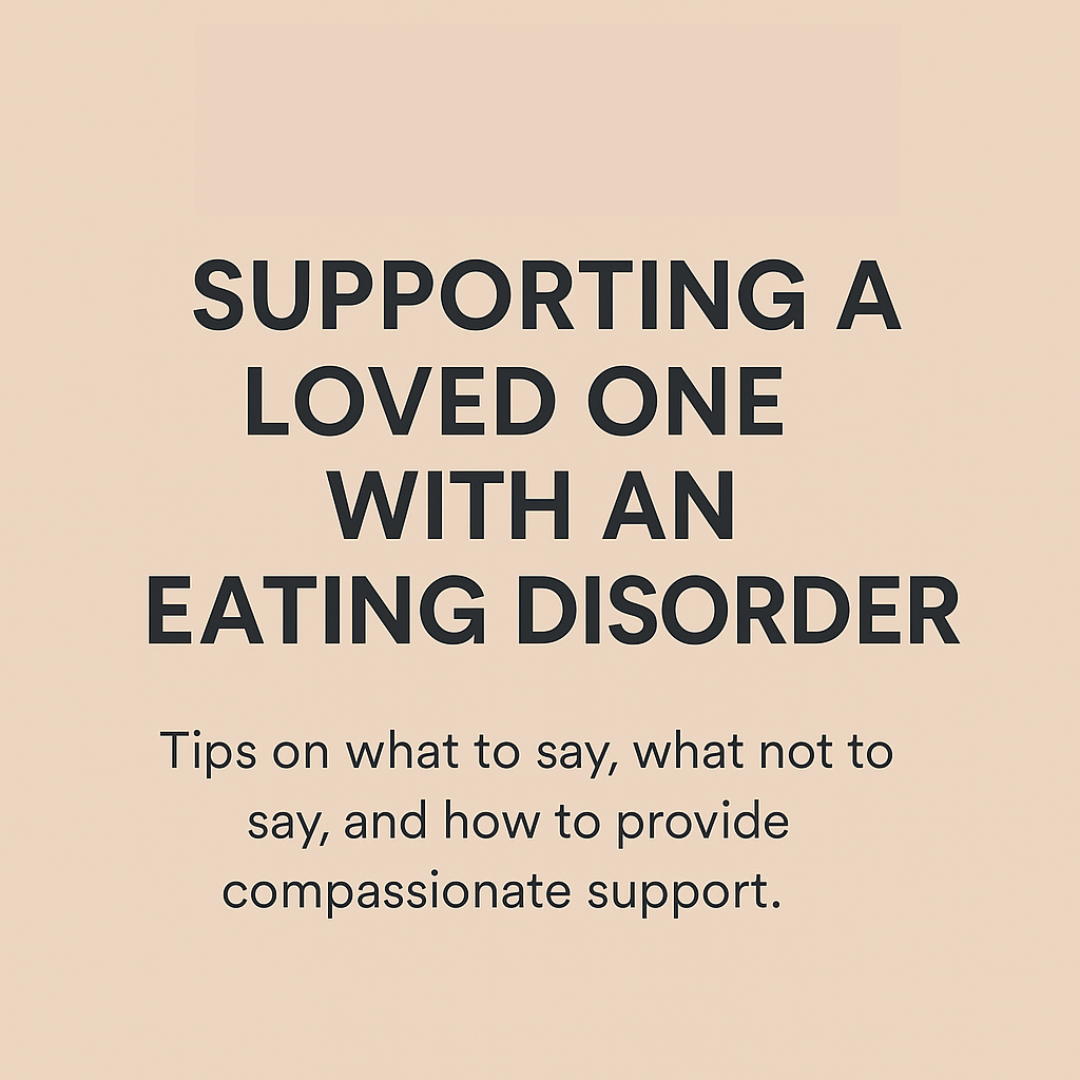How to Support a Loved One with an Eating Disorder: What to Say (and What Not to Say)
How to Support a Loved One Struggling with an Eating Disorder
When someone you care about is struggling with an eating disorder, it can be heartbreaking and overwhelming.
You might feel helpless, scared, or unsure of how to approach the situation—especially when your words or actions might unintentionally cause more harm than good.
The truth is, support from loved ones can be a powerful part of recovery—but only if it’s grounded in compassion, patience, and a deep understanding of what eating disorders actually are.
In this blog, we’ll explore how to support a loved one with an eating disorder, including what to say, what not to say, and how to be truly helpful without enabling disordered behaviors.
Understand the Basics of Eating Disorders
Eating disorders—like anorexia, bulimia, binge eating disorder, and ARFID—are serious mental health conditions, not just about food or appearance. They are often rooted in deeper issues such as trauma, anxiety, perfectionism, or control.
It’s important to remember:
You can’t “fix” this for them.
Eating disorders are not choices or phases.
Recovery is a long-term process, not a quick fix.
What To Say to Someone Struggling
The words you choose can either open a door for connection—or shut it down completely. Here are a few supportive phrases that may help:
🗣️ “I’m here for you—no matter what.”
This helps them feel safe and supported, even if they aren’t ready to talk.
🗣️ “You don’t have to go through this alone.”
Remind them that professional help exists—and that you’ll be there as they take that step.
🗣️ “I care more about your health and happiness than anything else.”
Focus on how you value them as a person, beyond their body or eating behaviors.
🗣️ “I may not fully understand, but I want to.”
This communicates empathy without assuming you know what they’re feeling.
What Not to Say
Even with good intentions, some comments can feel invalidating or triggering. Here’s what to avoid:
🚫 “You look great!”
Even compliments can reinforce harmful beliefs about appearance. Focus on qualities that aren’t tied to their body.
🚫 “Just eat more / less.”
Oversimplifying the issue ignores the emotional and psychological factors at play.
🚫 “But you’re not that thin.”
Eating disorders aren’t always visible (and they often are not!). You can’t tell someone’s struggle by looking at them.
🚫 “I went through something similar, and I got over it.”
While you may be trying to connect, this can feel dismissive. Everyone’s journey is different.
How to Offer Ongoing Support (Without Enabling)
Being supportive doesn’t mean ignoring red flags or minimizing harmful behavior. Here’s how to strike that delicate balance:
✅ Educate yourself.
Learn about the specific eating disorder they’re facing. Understanding the signs, symptoms, and risks helps you respond more effectively. Check back on my older blog posts to learn more about different eating disorders and body image struggles!
✅ Encourage professional help.
Offer to help research therapists (don’t worry, this post talks about finding therapy on Long Island, but it applies everywhere) or attend a consultation with them if they’re open to it.
✅ Don’t monitor their food.
You are not their therapist or food police. Monitoring can create shame and erode trust.
✅ Be patient with setbacks.
Recovery isn’t linear. Avoid expressing frustration if progress feels slow.
✅ Support healthy boundaries.
For example, if their behaviors are affecting shared meals or family events, have open conversations with kindness and firmness.
Final Thoughts on Supporting a Loved One with an Eating Disorder
Loving someone with an eating disorder is hard—but your support, presence, and willingness to learn can make a real difference.
If your loved one is open to therapy, or if you’re seeking guidance on how to support them while taking care of yourself, working with a therapist who specializes in eating disorders can help both of you navigate this process with more confidence and compassion.
Looking for Support?
I offer virtual therapy for individuals struggling with eating disorders and for loved ones who want to know how to help on Long Island, in New York and Florida. You don’t have to navigate this alone—schedule a free consultation to learn how therapy can help.
Coming Soon: How Eating Disorders Impact Relationships
In my next post, we’ll explore how eating disorders impact relationships—including romantic, family, and friendship dynamics—and how to rebuild connection in the midst of recovery.
*Disclaimer* - I am not a medical doctor and this post does not constitute as medical advice. This post is derived from my experience working with clients, research and collaborating with medical professionals.
